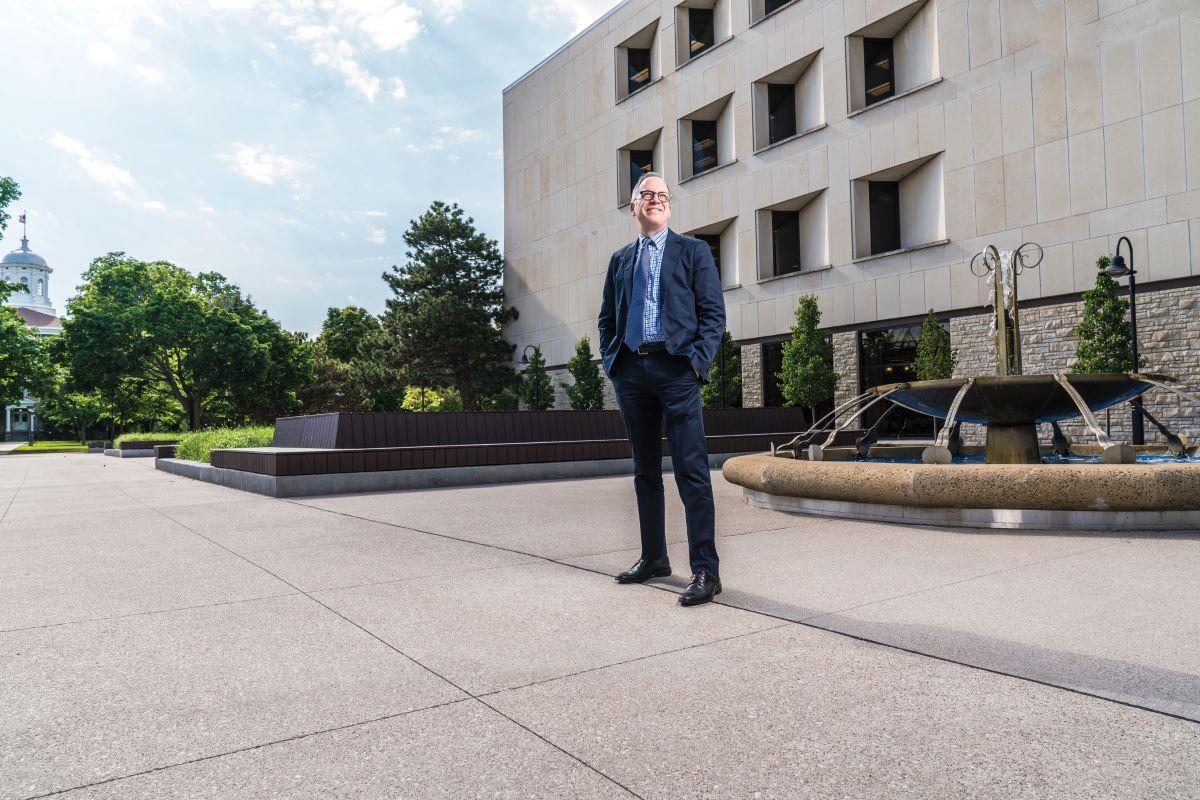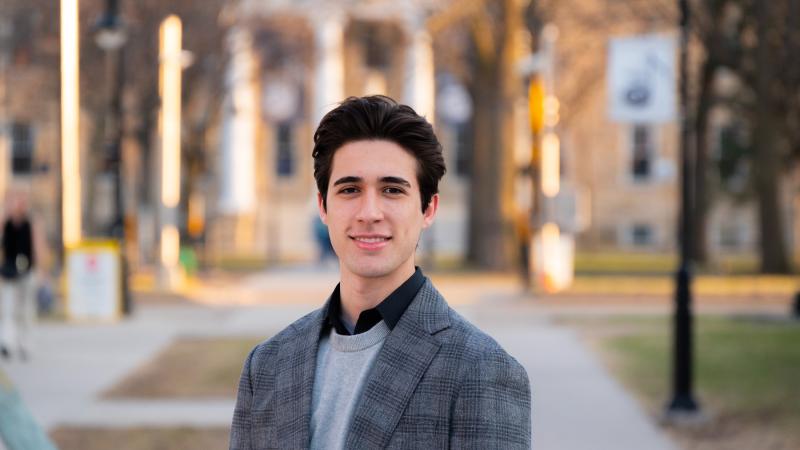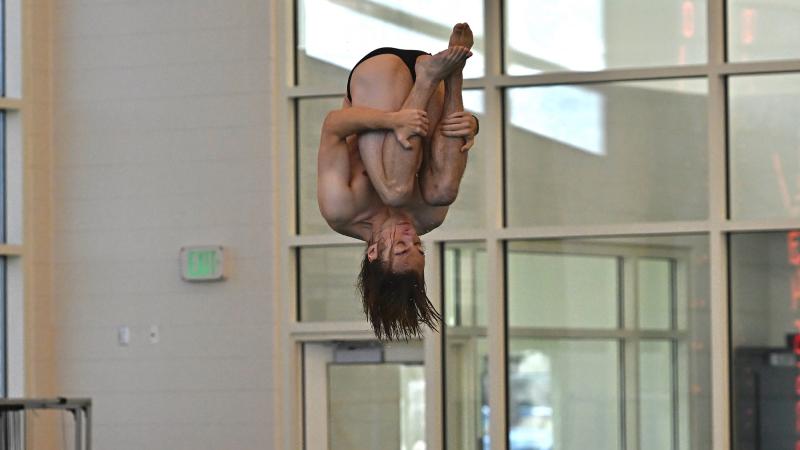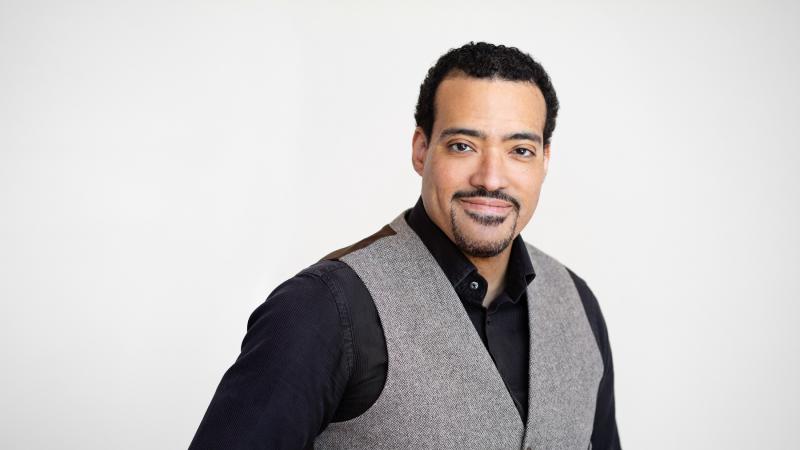From the spirit of human connection that infuses Lawrence to his love of the Viking Room, to the three words he’d use to describe Lawrentians, Lawrence Magazine spent some time with President Mark Burstein as he reflected on his time at Lawrence, what makes it so special, and what the future might hold for him.
Burstein, the 16th president in Lawrence’s 174-year history, announced in the fall that he would step down from his position at the close of the 2020-21 academic year. Laurie Carter is set to become the 17th president on July 1.
Hey, Lawrentians: Share a message to Mark Burstein
Here is our conversation with Burstein as he prepares for his final Commencement and his departure from Lawrence.
What do you remember about your first day at Lawrence?
My announcement day felt like the day I joined the Lawrence community. I was on campus in December for my announcement as president. And first I remember the weather—there were snow flurries—but I also remember the warmth of the community, the outreach to me through that day. Not only the Lawrence community, but also Appleton. It was the first time I met Tim Hanna, at that time mayor of Appleton. It was just a whirlwind of a day, but I remember the individual outreach and connection.
Did that first day give you any sense of the scope or scale or a look into what was to come for you?
I’d had the privilege of working for college presidents for 20 years before I became one, but it is different being one. That day underlined the intensity of that and the careful observance of every word and action to look for clues.
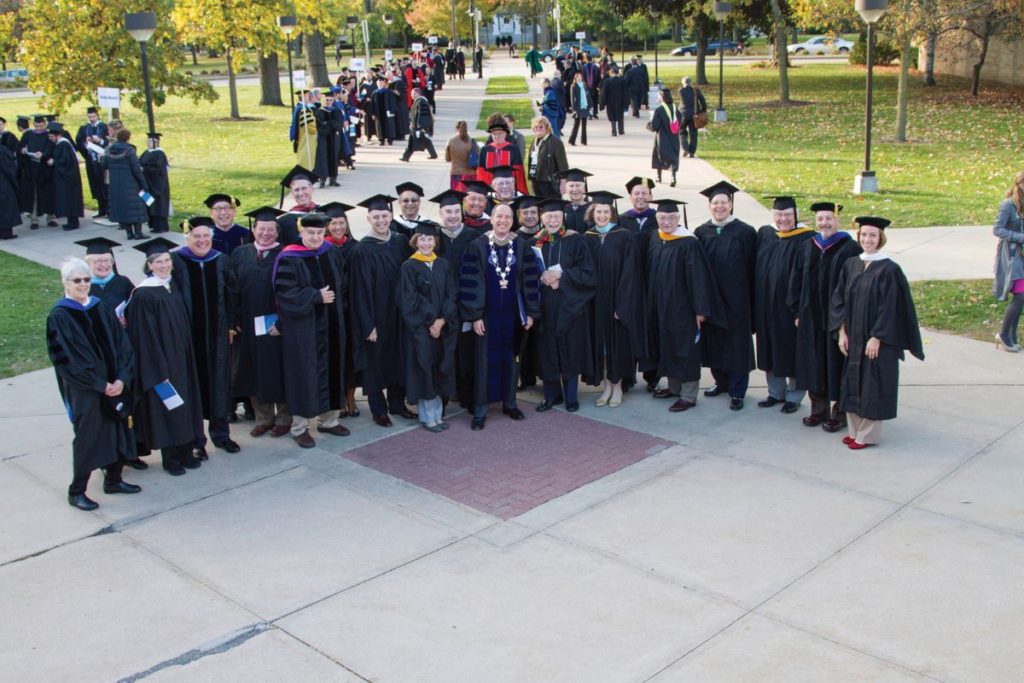
Inauguration day in 2013.
You mentioned having worked for other college presidents—you obviously came from an East Coast higher education tradition, some pretty elite names on your resume. What drew you to the Midwest and what drew you to Lawrence?
I was extraordinarily fortunate that I had a lot of options when I decided that being a liberal arts college president was probably my next step. There was just something that felt like a fit through all of my conversations at Lawrence. The sense of community, the focus on a rigorous academic education for a broader student body—I really wanted to move away from an institution that focused exclusively on academically perfect students.
Another thing that appealed to me through all the conversations was this sense of aspiring to be a better version of Lawrence rather than wanting to be another institution. Many institutions where I interviewed would say, “We are X, but we want to be Y,” and Y would be another liberal arts college. And I thought, “Hmm, that doesn’t sound like a lot of fun. Why don’t you want to be a better X when you already have some real strengths? Why don’t you want to be a better version of that?” And at Lawrence, those aspirations were central in every conversation that I had; it was just so appealing to me.
What do you think makes Lawrence Lawrence?
I think this theme around human connection, that we are a community where people make time for investing in and carefully stewarding human connection. It’s not always perfect. It is not always offered or received in the right way, but it is still a value of who we are and who we want to be, what we want to improve.
What is your favorite Lawrence memory?
This is clear in my mind: Commencement. Every Commencement is just … It is not only the culmination of the academic year, it is the culmination of students’ progress through Lawrence and the celebration of real accomplishment by faculty. So it’s just a moment where everything comes together, and each Commencement is clear in my mind and an event that I really cherish.
In addition to Commencement, what is your favorite Lawrence tradition and why?
I love both Cabaret and Cultural Expressions. Both of those events allow our students to fully express unique aspects of themselves in performance. It feels like such a privilege to experience them.

Personally greeting every first-year student became a tradition during Mark Burstein’s tenure.
What do you think it says about the Lawrence culture that so many traditions are events or rooted in events?
When I was thinking about my favorite spot on campus, I was torn between two places, and one of them is the Chapel, because it is a place of performance. It has all the history of Lawrence in the stained glass windows, in the representation of the classes when we welcome the first-year class. But it’s also in the decades of convocations spoken in the space, where we come together as a community to see performances happen. And I think it’s back to this theme around human connection—we gather as a community and listen to each other, experience one another’s performative work. Whether that’s music or spoken word or dance or theater, or athletics. That’s just such a central part of who we are as an institution.
What is that other favorite spot?
My other favorite spot is the Viking Room (VR). It’s a student owned space—the bartenders are students, it is filled with students. It also has that great view out to the river, so there’s an indoor-outdoor experience. It’s not the space that is best maintained or perfectly lit or perfectly cleaned, but it’s got a feeling of Lawrence in it that I think is really special.
And because it is a student-owned space, the VR has really kept up with the change of Lawrence. It has that grounding in 50 years of history, but it’s also contemporary Lawrence at the same time, which is a really nice thing.
What surprised you most about Lawrence or about Appleton or both?
I think that what surprised me most about Lawrence was how strong the welcome was for David and me, how much of an embrace we have felt from the community. I expected it to be something that was present for us, but it has far exceeded our expectations in so many different ways. And about Appleton, I think what’s really surprised us most is the food, the cosmopolitan nature of our food offerings. Both from the variety of the different food cultures and, as someone who is gluten-free, the amount of gluten-free options in the Valley is extraordinary, far beyond any other environment that I’ve ever lived in. And that’s a surprise.

Every Commencement is a treasured experience, Burstein said.
If you had to describe Lawrence in three words, what would those words be?
That is so hard. I think I would go with creative, community, and future.
Would you apply those same words to Lawrentians or would you have different three words?
For Lawrentians, I would go certainly with “passion.” The word “change,” those wanting to change the world, and maybe the word “connection.”
What has been your biggest challenge as president of Lawrence?
My biggest challenge, and I would argue the largest challenge facing Lawrence right now, is to make the transition from a predominantly white institution to one that is anti-racist and creates a learning environment in which every student, as well as every faculty and staff member, can thrive. It is a national, international, issue and it is certainly one that is a challenge alive and present on our campus every day. I’ve learned so much from the community and from my experience trying to make this change. And I have a lot more to learn, as I would argue many of us on campus do.
What will you look back on with the most pride or the greatest sense of accomplishment?
There are two places that really resonate for me. One is the effort to become full need and the progress we’ve made to support students and families financially to the level that our methodology says we should. That is work I did very closely with development colleagues. The other place is work with faculty renewing the curriculum. The various different curricular offerings that we have now that we didn’t before and how they really build off of strengths that already existed in our faculty and in their research.
What will you miss most and what will you miss the least?
What I will miss most are the people.
What I will miss least is the public nature of the role. Many people who are presidents receive energy from the public side of the role, but it is not personally a place where I get energy. The thing with the public piece is that I love the community experiences, and I love speaking to the community. I just don’t like every time I’m out, I am known and seen and stared at, and people always interact with me as president of Lawrence, even at the grocery store. Walking around Woodman’s and having folks come up to me and talk to me about issues on campus, and sometimes I think, “I know I’ve been spending a lot of time in the egg aisle, but I’m just trying to figure out if extra large is what I really need.”
And yet, at the same time, I think that one of the beautiful things about Lawrence is this relationship with Appleton. Sarah Appleton Lawrence, Amos Lawrence, this marriage between our college and municipality and the city. But because of the size of Appleton, it just means that is heightened in a way that I experienced in Princeton, New Jersey, but I certainly never experienced at Columbia in the City of New York.
If you could give one piece of advice to students, what would that piece of advice be?
Always know that we believe in you.
Any words of wisdom or tips for Laurie Carter as she prepares to take the helm?
Laurie is so talented and already a sitting president, so I think she knows the lay of the land. And I think she knows this already, but I just want to reinforce that there is so much talent here and that people are genuinely interested in supporting her.
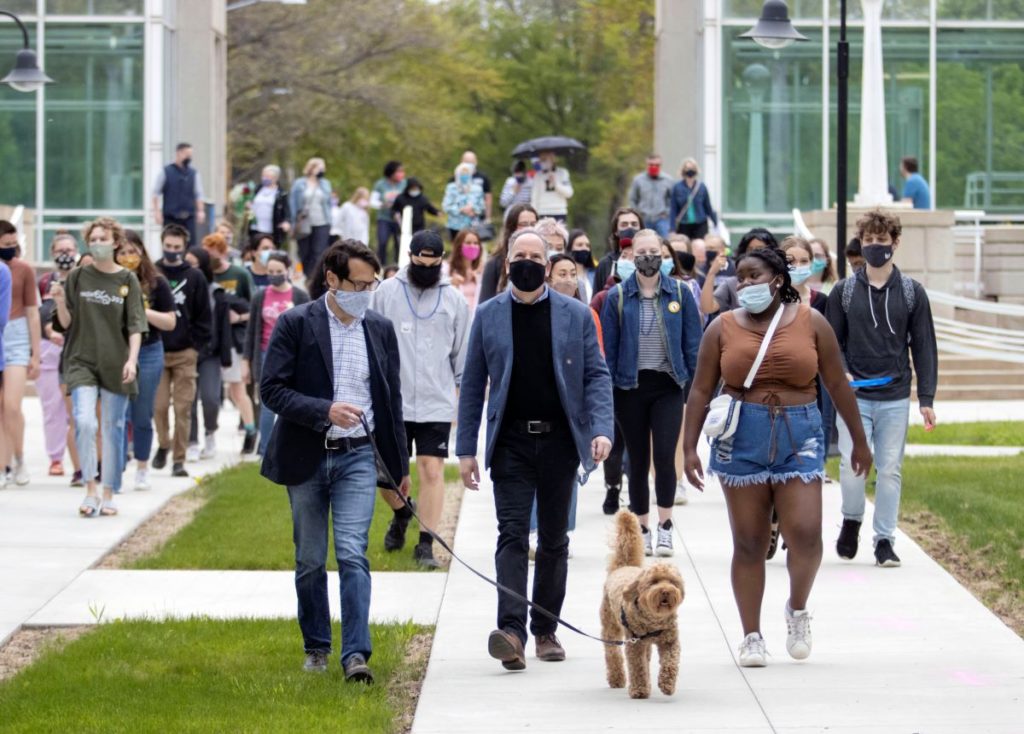
President Mark Burstein, joined by his husband, David Calle, and their dog, Homer, walks across campus with students and others in mid-May as part of Mark’s Last Lap, an event organized by the Lawrence University Community Council. (Photo by Danny Damiani)
Any insight on what’s next or what the future holds for you?
I have just started to think about what is next for me. It’s been a very demanding year, and I’ve wanted to make sure that I have been fully present for my responsibilities here. So that has meant thinking about next steps has been, well, a tertiary priority.
The one thing I have done that I’m super excited about is that in the past, my board commitments have always been connected to my responsibilities at my institutions, but now I’ve been freed up to follow my passions a little bit more. I just joined the African Wildlife Foundation Board. It focuses on environmental issues, which is a personal passion, and in a part of the world that I care deeply about. And it also has an almost entirely African programmatic staff and leadership based in Africa. So also following my values which is, “Yes, we Westerners can raise money for this and maybe give some advice, but let the leadership of the continent lead and think about what change would look like for them.” I’m really, really excited about it.
Any final thoughts or reflections on your Lawrence experience?
We say that we’re a learning community, and I have learned so much over my eight years here. And I just feel so grateful for that experience.
